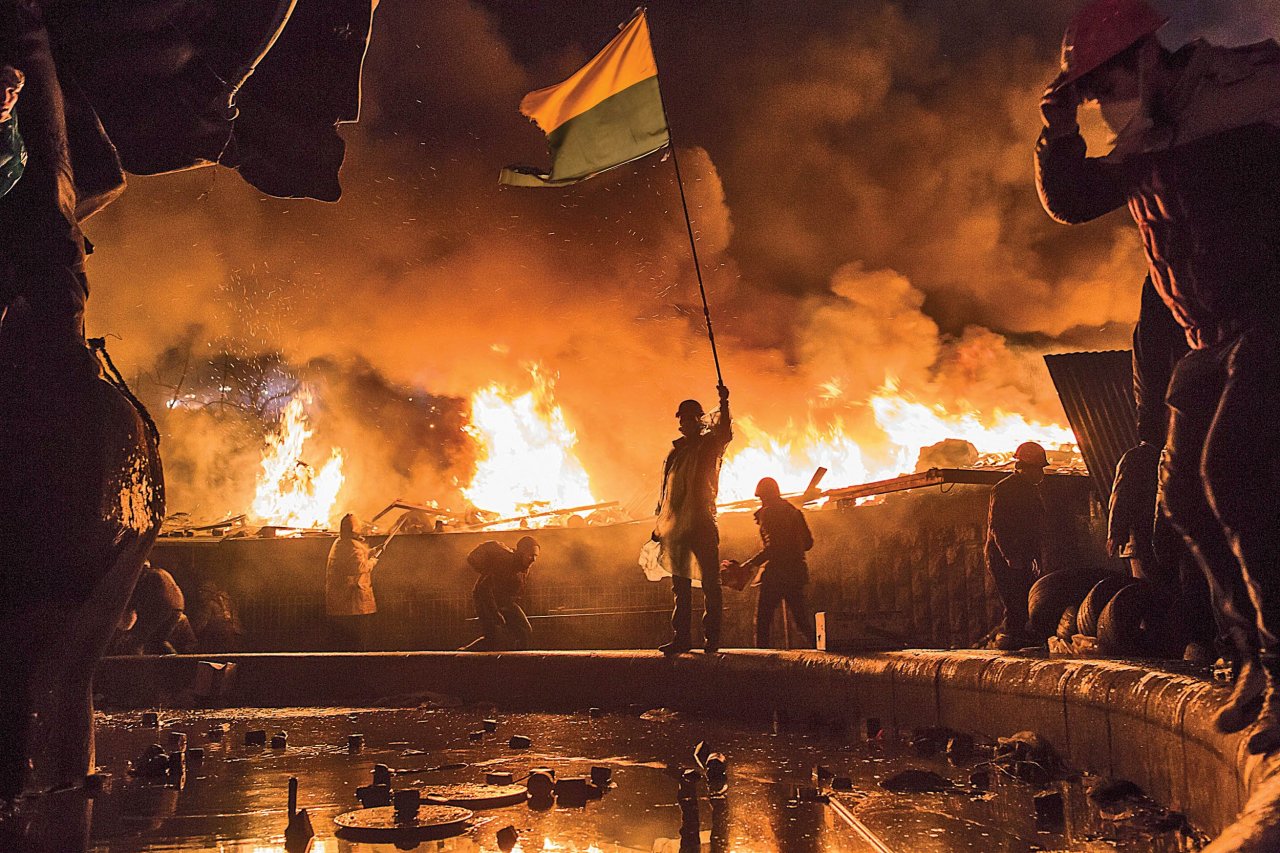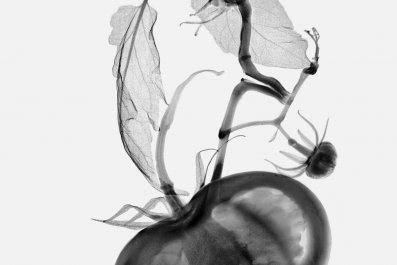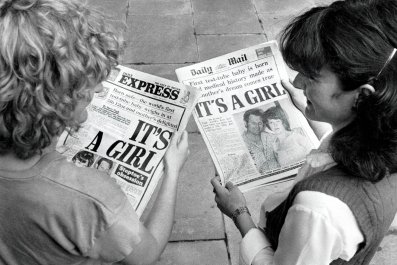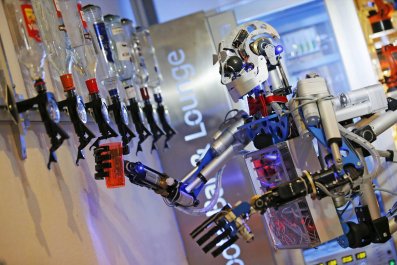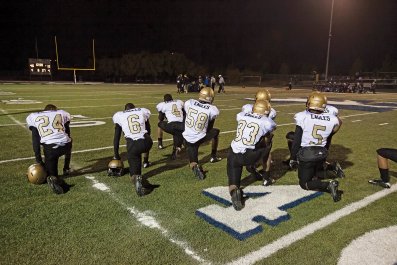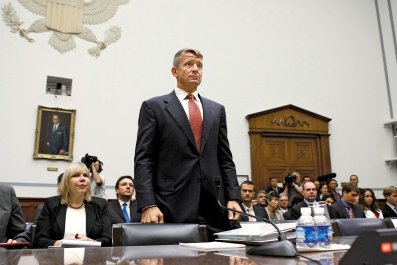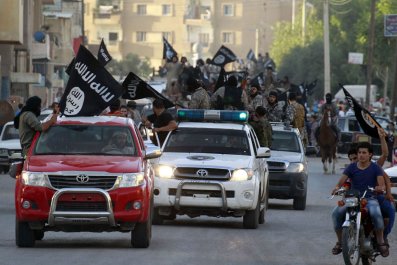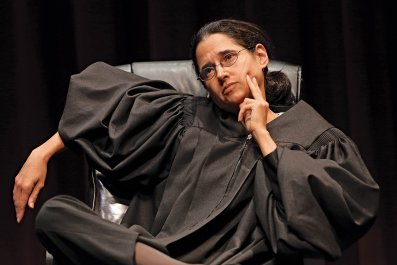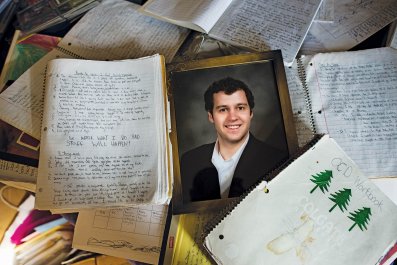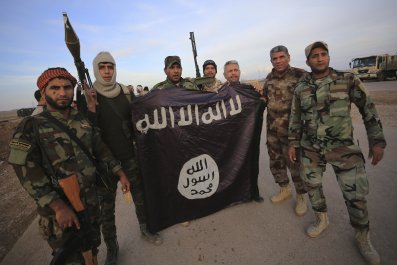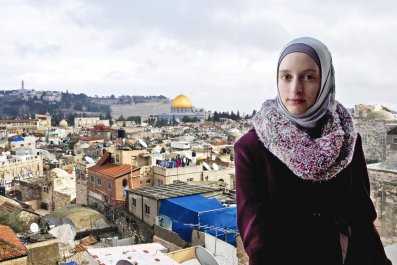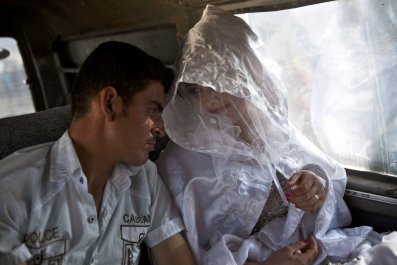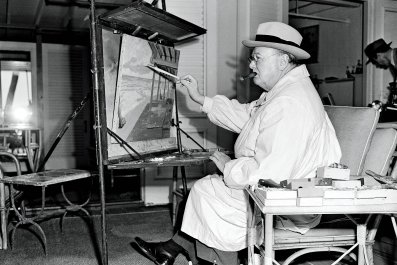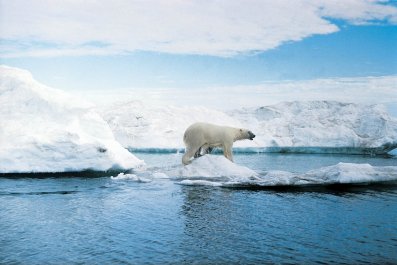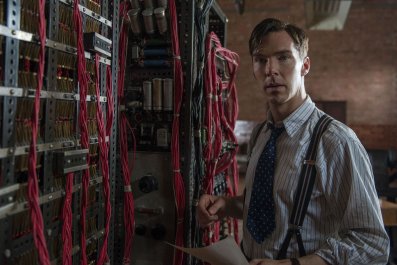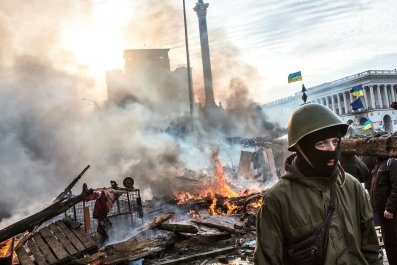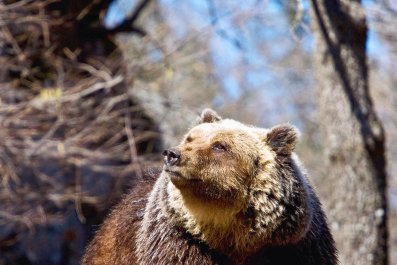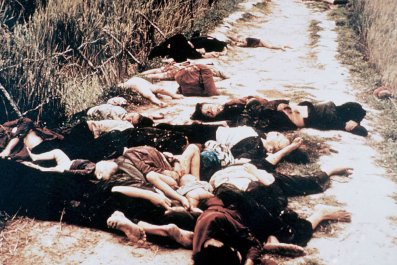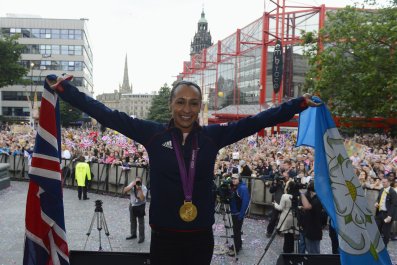The kid with the Kalashnikov isn't happy.
He scowls at us from under his rain cape, water dripping off the peak of his army cap.
He flourishes my passport. "Britain," he says. "You are from Britain."
We are stopped at a Donetsk highway rebel roadblock that does not appear to be under any kind of adult supervision. The skinny soldier with my documents stands alone under a lashing September rainstorm. His even-younger comrades huddle nearby under a tarpaulin draped over a pile of sandbags. He is a scrawny farm boy, no more than 20, with the kind of open face that should have a smile on it. Instead, his mouth is soured with an ugly pout.
"Tell your Daniel Radcliffe," says the young rebel, leaning into our car with weary, murderous languor. "Tell him that I used to love Harry Potter. But then I read that he was a drug addict. Tell him I'm very disappointed."
"I'm sorry to hear that," I say. "But I don't think it's true."
The kid snorts, cocks his head in a gesture of contempt and hands me back my passport and press accreditation. "But I read it," he says.
I scroll through possible responses. "No. Really. It's wrong, what you read. Daniel Radcliffe is not a drug addict."
The kid nods as if he'd love to believe me but knows better. He waves my driver and me on to continue our journey to Donetsk and turns back to the sagging tent of camouflage netting by the roadside.
Poor kid, I think. He used to love his Harry Potter. But now he's grown up, and the world has disappointed him. This time last year he lived in a different country—a country called Ukraine—that was at peace, if not exactly in harmony. Then, on November 21, 2013, a small group of protesters gathered in Kiev's Maidan Square to protest that their president, Viktor Yanukovych, was refusing to sign a cooperation deal offered by the European Union. They called their movement Euro-Maidan, after the Ukrainian name for the square. No one took much notice.
Six months later, Russia and Ukraine were effectively at war. Yanukovych and his mistress had fled the country. Russian forces had annexed Crimea, the first such land grab in Europe since World War II. Chunks of eastern Ukraine's Donetsk and Lugansk provinces had declared themselves "People's Republics," independent of Kiev and supported by Russian regular troops and surface-to-air missiles. Central Kiev had been turned into a war zone after running battles between hundreds of thousands of protesters and police. Malaysia Airlines Flight MH-17 had been blown out of the sky by a missile fired by rebels, which killed 298 people. Over 4,000 people have died in Europe's newest civil war.
As a result of all this, two important things happened. First, Ukraine became a country in a meaningful way. Over the past 23 years since it became independent from the USSR, Ukraine could not decide whether it was going to become a law-abiding, European nation of shopkeepers, like its Western neighbor (and sometime ruler) Poland—or take its place alongside Belarus and Kazakhstan in a revived Russian empire of kleptocratic dictatorships.
Vladimir Putin settled that question. Without the Russian-speaking population of Crimea, Donetsk and Lugansk, there will never again be a pro-Moscow government in Kiev. At the end of October, strongly pro-European parties swept to power in Ukraine's parliament. At the same time, the European Union and NATO found—for the time being at least—the mettle to agree on sanctions against Russia and economic and logistical support for Ukraine.
The war for the East continues. The economy teeters. The ultra-nationalists may not have done well in recent elections, but they are armed and organized into self-governing "patriotic battalions." This is perhaps a recipe for disaster of Yugoslav proportions, yet most Ukrainians remain surprisingly hopeful. "We found out who we are. And who [we] aren't," says Ruslana Khazipova, a young singer with the band Dakh Daughters. "We are free. And we aren't Russia's bitch anymore."
The second, more serious thing that happened, the thing that could yet hatch global disaster—is that Russia has been changed by this crisis in Ukraine. Russia has, in just a few short months, turned into an older, more vicious version of herself.
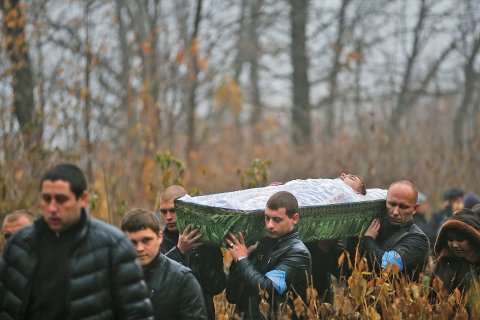
A Flag for the Stern God of Orthodoxy
Our former Harry Potter fan far behind us, we drive past vast fields of ploughed earth heavy and as dark as chocolate. The Don Basin—rebel territory—is rich farming country, as beautiful and golden as autumnal New England.
The next checkpoint boasts a full array of Donetsk People's Republic (DNR) imagery. The tricolor black, blue and red flag was borrowed from the short-lived Donetsk-Krivorog Republic that declared independence briefly in 1918 as czarist Russia collapsed in revolution. The newly designed flag of Novorossiya—New Russia—is clearly modeled on the flag of the American Confederacy. (Novorossiya is a czarist-era term for the regions of south and west Ukraine conquered under Catherine the Great; it's used now by the Kremlin to describe eastern Ukraine.) And there's a blood-red flag with a Byzantine face of Christ set in a large gold medallion. One flag for revolution, one for the Russian Empire, one for the stern god of orthodoxy. We drive on, through a flat landscape punctuated with slag heaps and pithead gear.
Donetsk is eerily empty, though the population was over 1 million before the war, and it was once one of the most prosperous cities in Ukraine. Large billboards over the main thoroughfares advertising concerts that happened in April are starting to peel.
For what is technically peacetime, there is a lot of shelling going on here. A cease-fire was signed by Ukrainian President Petro Poroshenko in Minsk in mid-September, yet weeks later the sound of artillery rolls over central Donetsk all day and much of the night. Donetsk's airport is held by the Ukrainian army, so the rebels bombard it furiously. The Ukrainians reply by lobbing artillery shells and Grad missiles into the city. Beneath the airport is a warren of Soviet-era bunkers and tunnels from the 1960s. The airport's Ukrainian defenders retreat with their howitzers down into the bowels of the building when the barrages get too heavy. In the distance the elegant, glass-and-steel bulk of the new airport rises from a mist of autumn rain and gun smoke.
Donetsk's main administration building is a vast, brutal block that dominates a wind-blasted square. In the shelter of an overhanging concrete porch, a couple of dozen citizens queue up to enter. A rebel commander listens to the petitioners one by one and issues peremptory orders. "Go to Office 210 and sign on to the queue.… No, we don't deal with that yet, come back next week. "
The public areas are covered with spray-painted graffiti. A pair of patriotic lovers has written "Lena + Pasha = [heart] Russia!!!!" Volunteers—or perhaps mercenaries—from the Caucasus have also left their mark on the walls. "Chechnya is with Donetsk," says one inscription.
Sergei Fedorenko is a skinny young man who studied history at university before signing up with the rebel administration as "a specialist on propaganda and agitation." He insists we repair to the men's toilets for a smoke. Despite the broken windows, ransacked offices and piles of charred paperwork lying around, the clean-living rebel leaders are anti-smoking scolds.
I ask him what the war is about.
"We don't want war, but we have no choice. While the Kievans were jumping around their Maidan waving flags, we in Donetsk were working. I was always pro-Ukrainian. But when they came to our lands armed and in anger, then I decided I had to defend myself. All we wanted was the right to rule our own affairs. This is our own Maidan—except that we didn't send anyone to try to seize Kiev."
Back in the lobby the petitioners have been cleared well back as a bevy of rebel bigwigs arrives for a meeting. These men and their bodyguards have obviously spent a lot of time in front of mirrors perfecting their look. Leather fingerless gloves are clearly in vogue, as well as U.S.-issue rubber knee pads, green bandanas and wraparound sunglasses. The younger ones appear to be fans of Call of Duty, while the older commanders channel Soviet war movies. They wear baggy breeches, leather webbing, tall black boots.
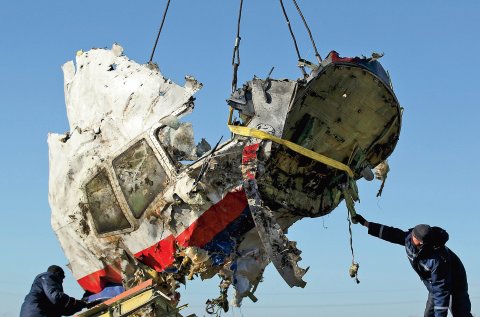
Our Man in Havana Banana
Night falls and the neatly swept streets empty for the 11 p.m. curfew. I see lights show in only a third of the windows.
I make my way to Havana Banana, a Cuban-themed basement bar. The interior design can best be described as Slavic Hawaiian. Donetsk's most famous author, Fyodor Berezin, arrives with an armed escort. Berezin has penned 22 volumes of futuristic military science fiction, which feature epic battles between a resurgent Soviet Union and decadent America. Since April, though, Berezin has served as the DNR's deputy defense minister. The author-turned-minister is in his 50s, and sports a neat white mustache. He looks like a cross between Colonel Sanders and Colonel Kurtz in Apocalypse Now. "When this war began I was asked, Do you want to be a commander or a creator?" he says. "I could have run away to Russia in April, but I decided no, I will stay and fight and try to create a new reality in the world, instead of just on a page."
Some of his views can politely be described as eccentric. He says he believes we all live in a matrix controlled by a complex program. He says "fascism is an extreme level of liberalism," and sees what is happening today in Ukraine as part of a slowly unfolding global conflict for resources.
"The Third World War began on September 11, 2001. At that moment, the Imperialists…decided that the natural resources are finite on this planet and we don't care with whom we go to war to get hold of them. That war began in Iraq, then moved to Syria and Libya, and now they have come to Ukraine.... Only Russia is a counterweight. Russia sits patiently with crossed arms and says, 'No!'"
Vast global wars are, I later discover as I read some of his works, a favorite Berezin theme. The cover of his 2009 novel, War of 2010. Ukrainian Front, features an airliner being blown out of the air by surface-to-air missiles. In this prophetic book Berezin tells the story of a world war sparked by a conflict in Crimea.
Like many of his generation—he is two years younger than Putin—Berezin is ambivalent about democracy and capitalism and deeply regrets the collapse of the Soviet Union. "I agree that the Soviet Union killed many people in the 1930s. But the sacrifice was justified! Just look where we were in the 1970s—everyone had what they needed, no one had to work much, everyone had leisure. So I see some historical justification for the 1930s. But I don't see any justification for what happened here in the 1990s. Now that was truly an unjustified genocide."
Now, with the formation of Novorossiya, he believes the opportunity has come to turn back the clock to a Soviet golden age of decency and fairness. "We smashed all the gambling machines by the side of the road," Berezin says proudly. "We dealt with the alcoholics and drug addicts harshly. We made them dig trenches for our troops. Before, they would just bribe the police—that won't be happening anymore. Our model is that society has to come before individuals. We will not accept rotten Western values—we don't like same-sex marriages."
The New Fat Cats
The demands of running a war economy dictate that all the property of businessmen and oligarchs who fled Donetsk must be confiscated. Despite the damage the fighting has done to the region's mining and infrastructure, Berezin is optimistic that soon this will be a "great metallurgical republic." All that's needed is the port of Maruipol, still in Ukrainian hands. "Mariupol and Donetsk airport will be taken. We have only begun to fight. Our fathers broke the fascists and ground them into dust. We will do the same."
At the Ramada Inn, the bar is packed. In the far corner, in a special alcove, is an enormously fat man in a sloppy shirt and loose tracksuit pants. His resemblance to Jabba the Hutt grows when he orders a hookah—all the rage in Moscow and now, it seems, in Donetsk. This man is a senior minister of the DNR; he was a successful local businessman in his previous life. His former bodyguards now wear the uniform of Novorossiya, but remain his private army.
Jabba is in the middle of a romantic drama that has been unfolding for some weeks. A bouncy, alarmingly blond lady in her 30s is the minister's good friend. She wears 1980s-style, high-waisted, stretchy, silver-sequined trousers. Unfortunately, the bouncy lady's husband is also a prominent local boxer-turned-businessman who has his own bodyguard posse. He is also one of the bosses of the DNR's prison service and sometimes shows up at the Ramada. When this happens, the wise customers ask for their bills.
Tonight, though, the star-crossed lovers sit undisturbed. An aide rummages in a nylon bag full of Nokia phones, all with labels taped on them: "burner" phones. The DNR seems to have learned its security techniques from The Wire.
"Meet the new bosses. Same as the old bosses," remarks an American colleague wryly. "There are three kinds of people in charge here. The old Soviet manager types. The local criminal types, old Yanukovych cronies. And the Russian military-intelligence types."
Only the second sort, the bandits, are in evidence tonight—honest Soviets like Berezin can't afford the Ramada's $8 beers, and the Russians tend to be ascetic, sober fellows who aren't eager to run into journalists.
These local fat cats are the only real victors of Novorossiya's revolution. Russia has reaped nothing but grief from it, with Putin now an international pariah and the economy poisoned at its roots by international sanctions. Ukraine, too, has been torn apart economically and politically—though with more hope than Russia of emerging from the experience stronger. And the people around Donetsk face a cold, hungry winter of fuel and food shortages, warmed only by nationalist rhetoric and empty promises.
This revolution is a victory of the old over the young, of the stupid over the clever. It is a victory of the past over the future. It is history repeating itself as tragedy and farce.
Owen Matthews's ebook on his experiences travelling through Ukraine, Thinking With the Blood is published today by Newsweek Insights.


